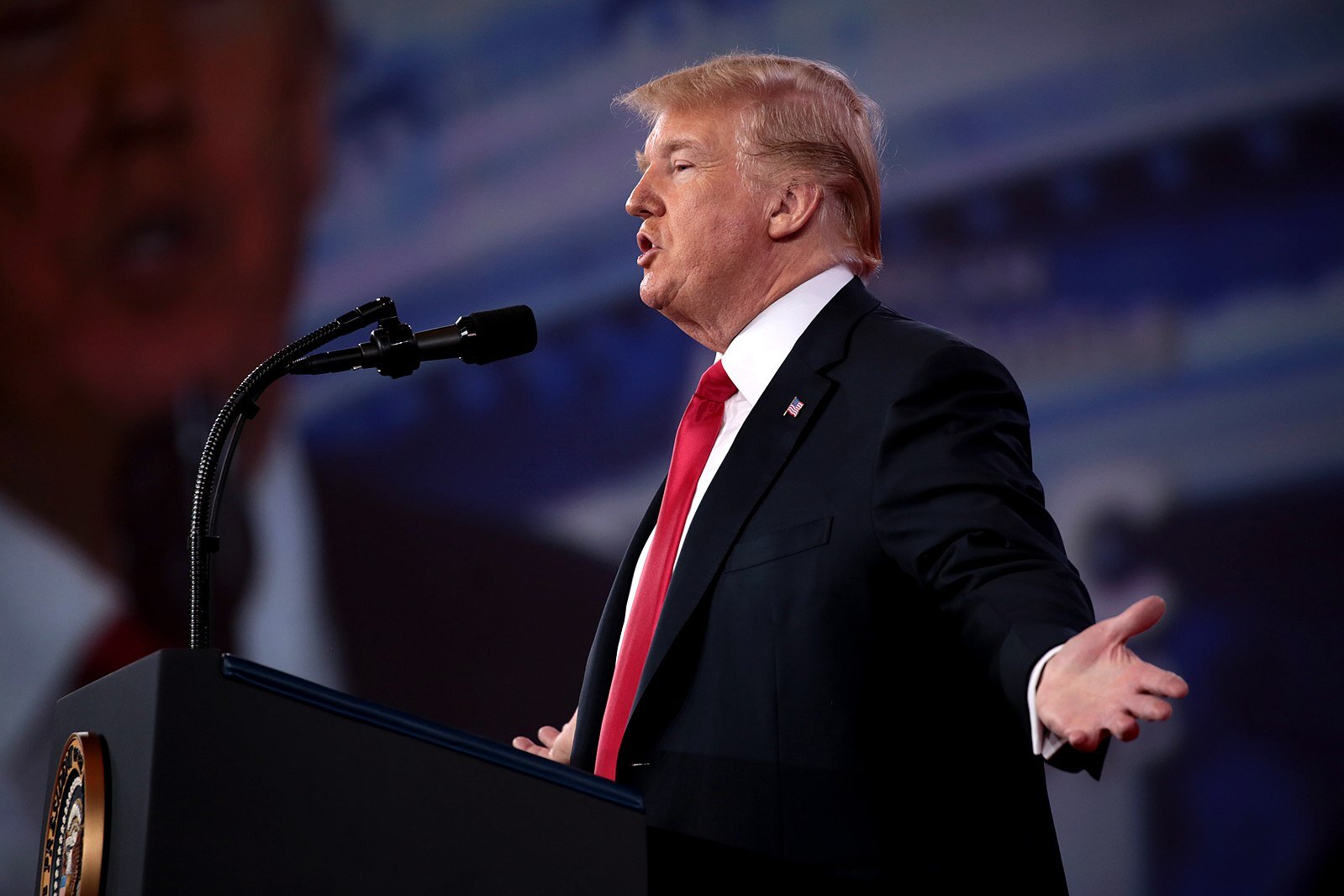
It’s over now. In the second impeachment trial of Donald Trump, 43 Senate Republicans cast their oaths to the wind and decided to give the former president a pass on the charge of Incitement to Insurrection. The fact that he was guilty as charged went without saying. After all, incitement has been Trump’s modus operandi dating back to his Central Park Five days. Was Donald Trump guilty of incitement when he tweeted out “LIBERATE MICHIGAN,” and a MAGA militia responded by hatching plans to kidnap Michigan Governor Gretchen Whitmer? According to the Senate Republicans, the answer is no. It is just how he rolls.
Presently there remains the problem of whether we can find our way back to some sense of the status quo. Not to the state of things before the impeachment trial – or even before the January 6th Insurrection – but to the world before Donald Trump. To a world where presidents see upholding the core institutions of our democracy as their most sacred duty, and the public at large accepts the results of elections. For all the death and destruction that ensued in the wake of Trump’s incitement of the January 6th attack on the Capitol, his greater crime was not incitement, but his continuing denial of the outcome of the election and undermining faith in our democracy.
Sixty years ago, on January 6, 1961, Vice President Richard Nixon presided over a joint session of Congress for the counting of the electoral votes from the 1960 presidential race. Nixon had just lost an excruciatingly close presidential election to Massachusetts Senator John F. Kennedy, and rumors of fraud were rife.
It was a different, more opaque time. Unlike today, when widespread election fraud is “nearly inconceivable” – as Ohio’s Republican Secretary of State Frank LaRose argued recently – deals could be made and conspiracies hatched in smoke-filled rooms, and no one might ever be the wiser. Rumors were widespread that ballot boxes in Texas had been stuffed by political allies of JFK’s running mate, Texas Senator Lyndon Johnson, tipping the balance to the Democrats; while in Chicago, it was either Mayor Richard Daley’s political machine or Joe Kennedy’s deal with Chicago mob boss Sam Giancana that had secured JFK’s victory in Illinois. Had those two states gone the other way, Richard Nixon would have won the Electoral College and the presidency.
It was against that backdrop that Nixon found himself – as Mike Pence did on January 6th and Al Gore had in 2000 – presiding over the final constitutional step in his own defeat. When the tabulation of the electoral votes was complete, Nixon reflected on the significance of the moment.
“This is the first time in 100 years that a candidate for the Presidency announced the result of an election in which he was defeated and announced the victory of his opponent. I do not think we could have a more striking and eloquent example of the stability of our constitutional system and of the proud tradition of the American people of developing, respecting, and honoring institutions of self-government. In our campaigns, no matter how hard fought they may be, no matter how close the election may turn out to be, those who lose accept the verdict, and support those who win… It is in that spirit that I now declare that John F. Kennedy has been elected President of the United States.”
It never occurred to me before the past few months that democracy in America was anything less than immutable, and forever etched in stone. At some point in the distant past, I had read the Federalist Papers and recalled the emphasis that James Madison placed on “republican virtue” as a cornerstone of our democracy. Yet, before experiencing the mayhem that Donald Trump inflicted on the nation over the past three months and watching his enablers in Congress amplify his lies about electoral fraud, it never had occurred to me that democracy itself depended on such a simple notion as “those who lose accept the verdict.”
Now, as we have seen the ease with which public opinion can be manipulated by social media and the news-entertainment complex, and a large percentage of one political party convinced of fraud claims made up out of whole cloth, the frail underbelly of our democracy has been exposed. For all the talk about the importance of the rule of law, our democratic system ultimately rests on a far shakier foundation: the vicissitudes of human nature and the willingness of individual candidates to accept the results of elections.
Democracy is not easy. Elizabeth Kübler-Ross famously described the five stages of grief as denial, anger, bargaining, depression, and acceptance; the same can be applied to losing an election. Standing before the voters after losing a bruising campaign is a test of character that every person who runs for office has to be prepared to face. One moment, a years-long campaign is coming to its climactic moment, and then, in a sudden, clarifying instant, it is over. Then, even as the candidate is processing the shock of having lost, they are expected to bring their supporters along. Not just in accepting the fact of the defeat, but in congratulating the victor and offering their support. Such is the demand of Madison’s “republican virtue” of every candidate who chooses to enter the arena. And every so often, candidates with particular strength of character take it a step further. They remind their supporters, in the midst of their grief, that they are part of something greater than winning and losing. They are part of the historic American experiment in self-government.
There is no small irony in seeing Richard Nixon as a champion of the essential role of individual virtue in the viability of democratic self-government. After all, even as he celebrated the moment where he declared JFK the president-elect as evidence of our success as a nation in developing, respecting, and honoring institutions of self-government, it was the pain of losing that election that led, in a relatively straight line, to Nixon’s reformulation of the GOP from the party of civil rights to the party of southern and working-class whites (his Southern Strategy), to the rising power of white evangelical voters within the GOP, to the election of Donald Trump, and, ultimately, to the January 6th Insurrection.
Yet, even as we have witnessed the transformation of the GOP from the Party of Abraham Lincoln to the rise of Donald Trump as the candidate and president of seething resentments, there was nothing particularly new about the hatred embodied in his politics. Historians widely credit the election of 1800, which pitted the southern and rural populations that supported Thomas Jefferson against the urban and coastal elites who backed John Adams, as the nastiest in the nation’s history. And so it has been for the ensuing 200+ years. The names and alignment of the political parties may have changed, but partisan hatreds have remained with us.
It is against that backdrop of a nation riven with sectarian divisions that honoring the will of the voters from one election to the next has been an indispensable obligation of political leadership. It is so basic that until recently, we have not been forced to grasp how elemental it is. On January 6th, just moments before the insurrectionists began their assault on the Capitol, Mitch McConnell made exactly that point as he sought to rein in mutinous members of his caucus, each of whom saw a path of personal advantage in continuing down Donald Trump’s perfidious path. To seek to overturn the verdict of the voters “would,” McConnell stated in no uncertain terms, “damage our Republic forever…. our democracy would enter a death spiral. We’d never see the whole nation accept an election again. Every four years would be a scramble for power at any cost.”</e m>
In his concession speech to George W. Bush in 2000, after the Supreme Court forced an end to the Florida recount, Al Gore quoted the words that Senator Stephen Douglas said to Abraham Lincoln in his 1860 concession speech. “Partisan feeling must yield to patriotism. I’m with you, Mr. President, and God bless you.” Gore then mirrored those words with his own.
“I say to President-elect Bush that what remains of partisan rancor must now be put aside, and may God bless his stewardship of this country…. I also accept my responsibility, which I will discharge unconditionally, to honor the new President-elect and do everything possible to help him bring Americans together in fulfillment of the great vision that our Declaration of Independence defines and that our Constitution affirms and defends.”
Every Senate Republican knows these words and knows their obligation. Yet this week, they did all they could to sidestep the obvious facts of Donald Trump’s incitement and duplicity, and once again showed their obeisance to a man whose conduct, time and again, has been destructive to the nation. He is not going away, and the stakes are only going to get higher. Trump’s term in office may have come to an end, but his power over his MAGA movement continues to grow.
According to an American Enterprise Institute poll released this week, despite Trump’s losing virtually all 60+ cases in court, the testimony of leading constitutional scholars, and Republican secretaries of state across the country, Donald Trump’s ‘Big Lie’ about the election is deeply rooted. According to that poll, two-thirds of Republicans continue to believe that the election was stolen, and fully 40% believe that violence may be necessary to put things right in the nation.
Since election day, we have heard that a civil war was looming within the GOP to wrest control from Donald Trump. Yet week after week, the loudest voices have been those of Ted Cruz, Josh Hawley, Rand Paul, and innumerable others who understand the treachery of their conduct as they are enabling Trump’s destruction of our democracy. Now the state parties are piling on to censure the conduct of any public official who strays from the MAGA fold. Our democracy is hanging in the balance. If there was going to be a civil war in the GOP, it best begin soon. Or perhaps it is already over.
______________________________________________________________________________________________________________________

David Paul
David Paul is the founder and President of the Fiscal Strategies Group, a financial advisory firm specializing in municipal and project finance. Prior to forming the Fiscal Strategies Group, Dr. Paul was a Managing Director and member of the Board of Directors of Public Financial Management, Inc. Dr. Paul also served as the Vice Provost of Drexel University, and as the CEO of Mathforum.com, a mathematics and math education website and virtual community that is now part of the National Council of Teachers of Mathematics.
Dr. Paul is the author of When the Pot Boils: The decline and turnaround of Drexel University, and has published regular commentaries on politics and economics on The Huffington Post and Medium, and at appalled.blogspot.com.
______________________________________________________________________________________________________________________






